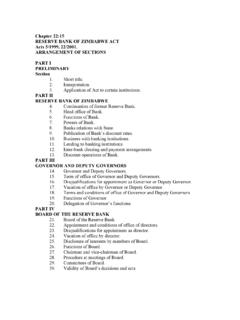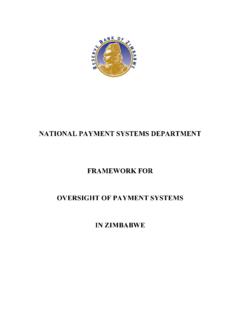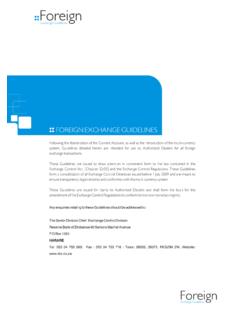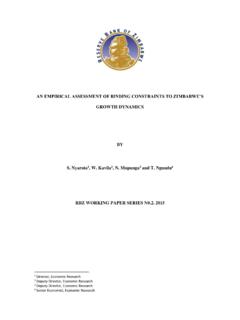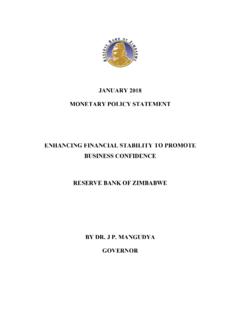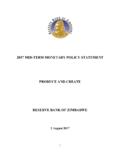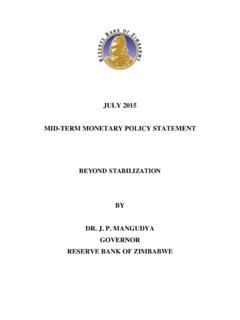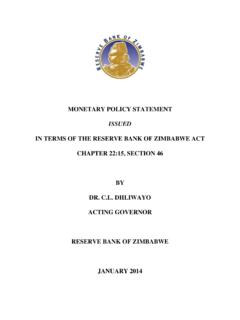Transcription of Cybercrime in Zimbabwe and Globally
1 Cybercrime in Zimbabwe and Globally 1. Background Cybercrime , also known as Computer crime, is any crime that involves a computer and a network. Cybercrime covers any illegal behavior committed by means of, or in relation to, a computer system or network. Cybercrime is a major component of the Anti Money Laundering and Counter Financing of Terrorism (AML/CFT) concerns. It is on the list of twenty-one prescribed predicate offences as listed by the Financial Action Task Force (FATF). In Zimbabwe 's National Risk Assessment (NRA) Report, of 2015, Cybercrime is listed as one of the crimes contributing to the US$1,8. billion estimated illicit proceeds generated from criminal activity annually in Zimbabwe . 1 Cybercrime is an offence that is committed against individuals, organizations or even states, with the intention to harm the reputation of the victim, or cause physical or mental harm, financial or proprietary loss, to the victim, using modern telecommunication networks such as internet, mobile phones phone networks and electronic payment systems.
2 Criminals are turning to the internet to facilitate criminal activities and maximize profits in the shortest time. Examples of cases of Cybercrime include credit card fraud, phishing, hacking, identity theft, unauthorized access, telecommunication piracy, malware, electronic money laundering, tax evasion, etc. 2. History of Cybercrime Computers and networks gained widespread use from the 1980s. Responsible hacking was then used to explore computer networks and improve their efficiency. At this stage, hacking did not pose any threat to economies or individuals, but over the years the sector was penetrated by criminals who used their knowledge and expertise to derive benefit by exploiting and victimizing others. This marked the beginning of Cybercrime . 2 Criminals exploit the speed, convenience, and anonymity of the internet to commit a range of criminal activities that know no borders, either physical or virtual.
3 Unlike the common crimes such as robbery, theft etc, Cybercrime is regarded as a borderless crime, which can be committed by one person who will not require being physically present at a location, but can be based in a remote location thereby evading law enforcement agencies. The systems that made it easier for people to conduct e-commerce and online transactions are now being exploited by cyber criminals to defraud the users. 3. International Trends on Cybercrime Cybercrime is a growing threat, the world over, as the growth of the internet has also resulted in the ballooning of crime. It is estimated that proceeds from Cybercrime constitute 3-5% of the global GDP. In the UK, the cost of Cybercrime is estimated at 27 billion per year, whilst global Cybercrime is estimated at US1 trillion per year and growing (Thomson Reuters Accelus).
4 3 Research has shown that 23% of British web users have fallen foul to a phishing scam and 1 in 5 individuals has been a victim of an email or website scam, with an associated cost of about billion. Experts believe that this makes Cybercrime the number one strategic crime threat to the UK, overtaking the illegal import of drugs and illegal immigration. Over 20,000 hacking attempts on the government infrastructure of the UK are detected each week. Of major concern are trojans, worms and hackers infiltrating IT. systems and stealing money and information. Fraud and the theft of intellectual property have become major phenomena throughout the world. In the US, online industrial spying presents a growing threat, with tens of billions of trade secrets, technology and intellectual property being siphoned each year from the computer systems of US.
5 Government agencies, corporations and research institutions. Incidents of hacking into governments and private corporations data-bases have also exposed the vulnerability of both public and private IT systems. The Wiki-leaks Julian Assange, who hacked into the US. government databases and released the information into the public domain, resulting in serious compromise of the US. government's foreign relations. 4 A whistleblower Edward Snowden, an American computer professional, and former CIA employee, leaked classified information from the US National Security Agency, in 2013. The information revealed numerous global surveillance programmes. Recently, massive hacking of over 4,000,000 US government employees' data by unknown hackers, took place and this confirms that Cybercrime has escalated to a level of global threat.
6 The recent hacking into the Canadian online dating website, Ashley Madison, exposed private details of 35 million users of the website, a few of whom have reportedly now committed suicide out of shame. a) Many in Zimbabwe have encountered spam emails, phishing attempts and fake websites designed to defraud us. Cyber criminals are also able to track users' movements and passwords via malware and key-logger attempts, and even via USB sticks that may have been infected with viruses. b) The funds generated through Cybercrime are laundered through various channels that may include real estate, foreign and domestic investments. 5 Categories of Cybercrime Cyber-crimes fall into three (3) broad categories, namely crimes against - Individuals and corporations;. Property; and Government. Each category can be exposed to a variety of criminal methods, varying from one criminal to the other.
7 Individuals: This type of Cybercrime can be in the form of cyber stalking, distribution of pornography, trafficking etc. Property: Examples abound where criminals . steal a person's bank details which they use to steal money, cloning of credit cards, use malicious software to gain access to an organization's website and steal information or disrupt the systems of the organization. 6 In Zimbabwe , criminals have used the mobile money transfer platforms, tricking unsuspecting members of the public to make payments for non-existent services. Government: cybercrimes against a government are referred to as cyber-terrorism. Criminals hack into government websites, military websites with various motives, including stealing or destroying information or simply to embarrass the government. The perpetrators can be terrorist or individuals unfriendly to the Government of the day.
8 Types of Cybercrime Although there are many examples of cyber crimes, a few relevant types are picked and discussed here. Card Fraud Card fraud is a major Cybercrime that is experienced by many countries. Criminals steal or clone credit and debit cards issued by banks and use them to steal from bank customer bank accounts or making online purchases. 7 Identity Theft Identity theft happens when fraudsters access enough information about someone's identity (name, date of birth, current and previous addresses) to commit fraud. Victims are either alive or deceased and through identify theft, victims lose money when criminals use their names to access bank loans, mortgages and credit cards. Fake lottery / inheritance These are advanced fee frauds, where victims are asked to make an advance payment for a favour or benefit to be derived from a transaction.
9 These scams are common and a number of Zimbabweans have fallen victim with the authorities having received a number of such reports. For example, a victim is advised he/she has won a lottery or that his/ her account is due to be credited with a huge sum of money and is asked to make a small payment up-front to cover administrative or similar costs before disbursement. Electronic Money Laundering Virtual Currency Electronic funds transfers have been used in concealing and moving proceeds of crime across jurisdictions. With the emergence and proliferation of various technologies of electronic commerce, criminals are using virtual currency to launder funds and evade tax. 8 Of interest is the use of Bitcoins, Webmoney, Paymer, and Perfect Money. Bitcoin is a new innovative payment network, which uses peer-to-peer technology to operate with no central authority or bank.
10 It is a form of digital currency created and held electronically, through computer software which generates virtual value from a process called Bitcoin mining where people are tasked to solve complicated mathematical problems. Proceeds from drugs, smuggling, money laundering are valued in Bitcoins which cannot be traced to its owner since it uses anonymous names and is independent of monetary authorities. It has been reported that hackers are demanding Bitcoins as ransom for release of information that they would have hacked from governments and corporates. Electronic Vandalism, Terrorism And Extortion Criminals and terror groups are using telecommunications systems to vandalise, extort and terrorise societies and nations. A number of individuals and protest groups have hacked the official web pages of various governmental and commercial organisations and are vandalising databases.
